Nissan Interstar VS Tesla Model S – Specs, Efficiency & Price Comparison
Which model is the better choice – the Nissan Interstar or the Tesla Model S? We compare performance (170 HP vs 1020 HP), boot capacity ( vs 793 L), efficiency (7.40 L vs 17.50 kWh), and of course, the price (34900 £ vs 94300 £).
Find out now which car fits your needs better!
The Nissan Interstar (Cargo Van) is powered by a Diesel or Electric engine and comes with a Manuel or Automatic transmission. In comparison, the Tesla Model S (Hatchback) features a Electric engine and a Automatic gearbox.
When it comes to boot capacity, the Nissan Interstar offers , while the Tesla Model S provides 793 L – depending on what matters most to you. If you’re looking for more power, you’ll need to decide whether the 170 HP of the Nissan Interstar or the 1020 HP of the Tesla Model S suits your needs better.
There are also differences in efficiency: 7.40 L vs 17.50 kWh. In terms of price, the Nissan Interstar starts at 34900 £, while the Tesla Model S is available from 94300 £.
Compare all the key specs now and find out which model fits your lifestyle best!
Nissan Interstar
The Nissan Interstar is a versatile van that expertly combines practicality with modern design. It offers a spacious interior that caters to both cargo and passenger needs, making it ideal for businesses and families alike. With its robust performance and efficient fuel consumption, the Interstar stands out as a reliable choice in the commercial vehicle market.
detailsTesla Model S
The Model S continues to set the standard for luxury electric vehicles, seamlessly blending performance with cutting-edge technology. Its sleek design and spacious interior provide an unparalleled driving experience, making it an ideal choice for modern enthusiasts. With features that emphasize both safety and sustainability, the Model S showcases the future of automotive innovation.
details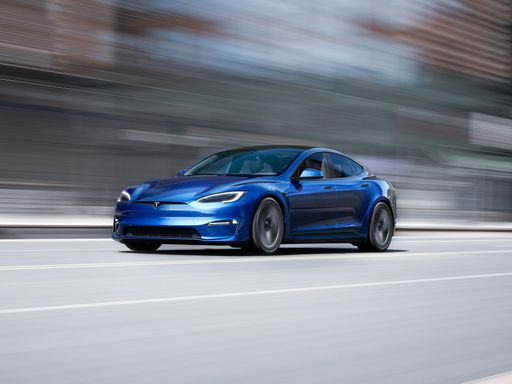 @ Tesla
@ Tesla
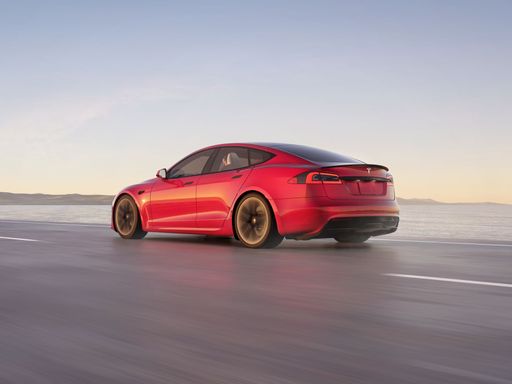 @ Tesla
@ Tesla
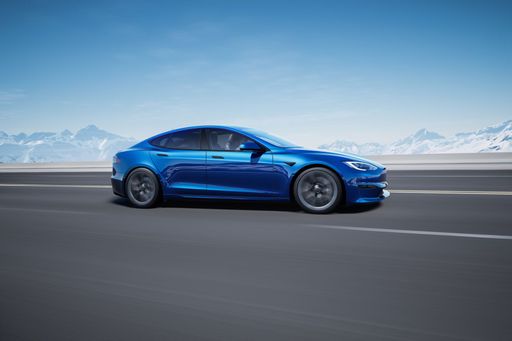 @ Tesla
@ Tesla
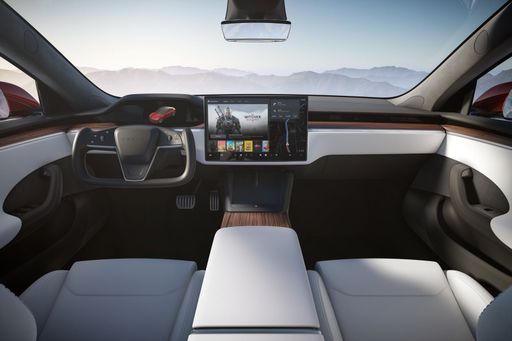 @ Tesla
@ Tesla
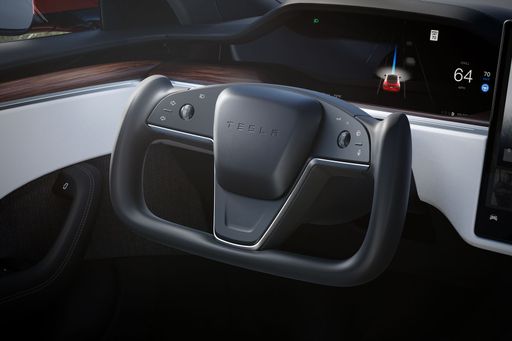 @ Tesla
@ Tesla
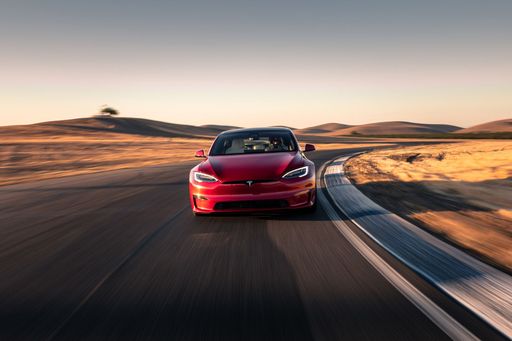 @ Tesla
@ Tesla
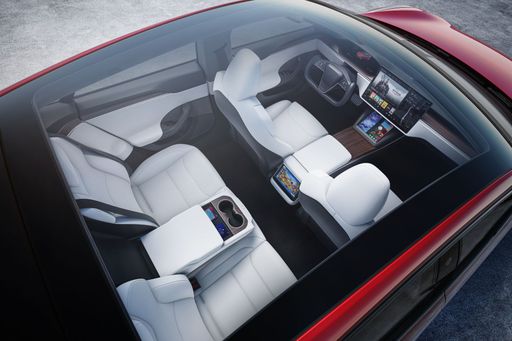 @ Tesla
@ Tesla

|
|
|
|
|
Costs and Consumption |
|
|---|---|
|
Price
34900 - 55600 £
|
Price
94300 - 102800 £
|
|
Consumption L/100km
7.4 - 7.5 L
|
Consumption L/100km
-
|
|
Consumption kWh/100km
-
|
Consumption kWh/100km
17.5 - 18.7 kWh
|
|
Electric Range
175 - 410 km
|
Electric Range
600 - 634 km
|
|
Battery Capacity
-
|
Battery Capacity
-
|
|
co2
0 - 195 g/km
|
co2
0 g/km
|
|
Fuel tank capacity
80 L
|
Fuel tank capacity
-
|
Dimensions and Body |
|
|---|---|
|
Body Type
Cargo Van
|
Body Type
Hatchback
|
|
Seats
3 - 7
|
Seats
5
|
|
Doors
4
|
Doors
5
|
|
Curb weight
2053 - 2535 kg
|
Curb weight
2170 - 2265 kg
|
|
Trunk capacity
-
|
Trunk capacity
793 L
|
|
Length
5680 - 6315 mm
|
Length
5021 mm
|
|
Width
2080 mm
|
Width
1987 mm
|
|
Height
2498 - 2756 mm
|
Height
1431 mm
|
|
Payload
965 - 1447 kg
|
Payload
364 kg
|
Engine and Performance |
|
|---|---|
|
Engine Type
Diesel, Electric
|
Engine Type
Electric
|
|
Transmission
Manuel, Automatic
|
Transmission
Automatic
|
|
Transmission Detail
Schaltgetriebe, Automatikgetriebe
|
Transmission Detail
-
|
|
Drive Type
Front-Wheel Drive
|
Drive Type
All-Wheel Drive
|
|
Power HP
105 - 170 HP
|
Power HP
670 - 1020 HP
|
|
Acceleration 0-100km/h
-
|
Acceleration 0-100km/h
2.1 - 3.2 s
|
|
Max Speed
115 - 177 km/h
|
Max Speed
250 - 300 km/h
|
|
Torque
300 - 380 Nm
|
Torque
-
|
|
Number of Cylinders
4
|
Number of Cylinders
-
|
|
Power kW
77 - 125 kW
|
Power kW
493 - 750 kW
|
|
Engine capacity
1997 cm3
|
Engine capacity
-
|
General |
|
|---|---|
|
Model Year
2024 - 2025
|
Model Year
2022 - 2023
|
|
CO2 Efficiency Class
G, A
|
CO2 Efficiency Class
A
|
|
Brand
Nissan
|
Brand
Tesla
|
Nissan Interstar
The Evolution of the Nissan Interstar
The Nissan Interstar has long been a staple in the commercial vehicle sector, known for its robust build and practical design. The latest iterations have further cemented its status with a range of technical enhancements and innovative features aimed at aiding businesses in achieving optimal efficiency. Whether you're navigating city streets or traversing the highways, the Interstar stands out as a reliable workhorse ready to meet various transport needs.
Power and Performance
The current range of Nissan Interstar models boasts diesel engines ranging from 105 to 180 PS, offering a commendable blend of power and fuel efficiency across the board. With a fuel consumption of between 7.4 and 7.5 litres per 100 kilometres, these vehicles are designed to minimise operational costs while maximizing performance.
All models feature four-cylinder engines, with engine displacement between 1997 and 2299 cm³, capable of producing torque figures between 330 and 400 Nm. These specifications ensure that the Interstar offers superior pulling power, which is particularly useful for transporting heavy loads across different terrains.
Transmission and Drive Options
Versatility is at the heart of the Nissan Interstar, with transmission options including both manual and automatic gearboxes. Drivers can also choose between front-wheel and rear-wheel drive configurations, allowing the vehicle to suit specific logistical requirements or personal preferences.
For those seeking simplicity and ease of use in urban environments, the Interstar with its automated gearshift provides a smooth driving experience, reducing driver fatigue and increasing focus on the road ahead.
Dimensions and Load Capacities
The Nissan Interstar is available in various lengths, from 5048 mm to an extensive 6848 mm, catering to diverse commercial needs. With widths ranging from 2070 mm to 2222 mm and heights from 2307 mm to 2808 mm, the Interstar offers multiple configurations to maximise cargo space and accommodate various loads.
With a maximum payload capacity of up to 1451 kg, businesses can rest assured that the Interstar is more than capable of delivering goods efficiently without compromising on safety or comfort.
Innovation and Technological Features
While functionality remains a priority, Nissan has not skimped on technological advancements. Among the innovations included are advanced safety features, such as anti-lock braking systems (ABS), electronic stability control (ESC), and a variety of sensors to assist with parking and reversing.
In terms of driver comfort, the brand offers multiple trim levels with exceptional interior features designed to enhance driver experience during long hauls. Options such as climate control, advanced navigation systems, and modern infotainment setups are available, ensuring that both driver and passenger remain comfortable and connected, regardless of the journey length.
Coachwork and Trim Options
The Interstar line-up provides a range of trim levels and equipment lines, from the entry-level Visia to the high-spec Tekna, catering to different market demands and individual preferences. The selection allows buyers to prioritise features that best suit their operation or driving style.
For example, the N-CONNECTA variant offers an array of added extras, enhancing both connectivity and comfort for drivers who rely on the vehicle as a mobile office.
Conclusion
The Nissan Interstar represents a harmonious blend of power, efficiency, and technological innovation in the large van segment. With its vast array of options and features, the Interstar is undeniably a top choice for businesses looking to invest in a dependable and adaptable commercial vehicle. As the line-up continues to evolve, the Interstar remains poised to meet the growing challenges and demands of the modern logistic landscape.
Tesla Model S
The Revolutionary Tesla Model S: The Pinnacle of Electric Vehicles
The Tesla Model S has reshaped the landscape of electric vehicles since its introduction, combining luxury, performance, and cutting-edge technology into a single package. As we delve into the technical aspects and innovations of this remarkable car, it becomes clear why it stands out in an increasingly crowded market.
Performance That Redefines Speed
The latest iterations of the Tesla Model S offer exhilarating performance, with two distinct variants: the standard Model S and the thunderous Model S Plaid. The standard Model S is powered by a robust electric motor producing 670 horsepower, allowing for a jaw-dropping 0-100 km/h time of just 3.2 seconds. For those who demand even more power, the Model S Plaid boasts a staggering 1,020 horsepower, achieving the same speed in an incredible 2.1 seconds.
Both models feature all-wheel drive and a sophisticated reduction gearbox that ensures optimal traction and efficiency, making every drive an exhilarating experience. The Model S’s top speed reaches up to 250 km/h for the standard version, while the Plaid variant impressively escalates to 300 km/h.
Range and Efficiency: Driven by Innovation
One of the most significant concerns for electric vehicle owners is range, and Tesla has addressed this head-on with the Model S. The standard Model S boasts an impressive electric range of 634 km on a single charge, demonstrating the extraordinary efficiency of Tesla’s engineering. The Plaid model, while slightly less at 600 km, still puts many competitors to shame.
The energy consumption rates for both models are equally commendable, with the standard version achieving a remarkable 17.5 kWh/100 km and the Plaid version at 18.7 kWh/100 km. This high efficiency is not only good for the environment but also for the owner's wallet, providing longer driving ranges between charges.
Innovative Technology and Features
The Tesla Model S is loaded with high-tech features designed to enhance the driving experience. The centerpiece of this technological innovation is its large touchscreen interface. This 17-inch display controls virtually every aspect of the vehicle, from navigation to climate control, creating a streamlined and modern cabin environment.
Additionally, the Model S includes advanced autopilot features that allow for semi-autonomous driving capabilities, redefining what drivers can expect from their vehicles. These innovations highlight Tesla's commitment to safety and convenience, making the Model S not just a car but an advanced tech-laden machine.
Luxury Meets Practicality
The Model S does not compromise on luxury. With a spacious interior accommodating five passengers and a premium finish, it offers comfort that rivals luxury sedans. The trunk capacity of 793 liters ensures ample space for luggage or other essentials, making it a practical choice for families or long road trips.
Moreover, its sleek hatchback design merges elegance with functionality, while the eco-conscious design features a remarkable CO2 efficiency class of A, underscoring Tesla’s commitment to sustainability.
Conclusion: The Future Is Electric
The Tesla Model S exemplifies the future of automotive technology, merging unparalleled performance, innovative features, and luxury. As electric vehicles continue to gain traction in the global market, the Model S stands as a benchmark, illustrating what is possible when cutting-edge technology meets passionate engineering. As drivers demand more from their vehicles, the Model S proves itself not just as a car, but as a movement toward a sustainable and exhilarating future.
The prices and data displayed are estimates based on German list prices and may vary by country. This information is not legally binding.
